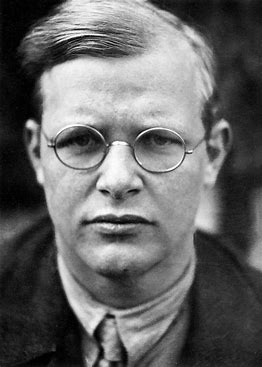If you’ve heard the phrase, “cheap grace,” you know something about the one who made it famous, Dietrich Bonhoeffer. He coined the phrase in his book, The Cost of Discipleship. As he looked at the churches in Nazi Germany, he found many that relied on the grace of God but failed to live up to the challenges of discipleship. Though the Apostle Paul insists that grace is free, Bonhoeffer believed that many had cheapened it by failing to live the demands of Christ, an echo of 1 John 2:3-6.
Other books by Bonhoeffer include Life Together—his thoughts on how to live as a community of God’s people—and Psalms, The Prayer Book of the Bible. These are a small part of Bonhoeffer’s written works. Eric Metaxas has written about his life in, Bonhoeffer: Pastor, Martyr, Prophet, Spy. Such a title should attract readers who want a thrilling, dangerous, and suspenseful story. Indeed, his is a real-life story of danger, courage, and Christian commitment. (Metaxas is the same author of the book mentioned last week about William Wilberforce.)
Experiencing the Cost
If anyone experienced the true cost of discipleship, it was Dietrich Bonhoeffer. He was a Lutheran pastor who caught the eye of many people not only in his home country but in America as well, where he spent a few years. Though he had been offered a teaching position in the United States, he felt the call to serve God in his home country because of the threat of the Nazis and the need of the church to resist tyranny.
Early in his career, Bonhoeffer joined with others in the Lutheran church to resist the government’s attempts to remove all things Jewish from the church. This included anyone of Jewish heritage. His family had friends and colleagues who were of Jewish ancestry, and he felt this was a clear violation of God’s will. We also know that to rid Christianity of its Hebrew roots throws out the entire Old Testament with all its teachings about the nature of God but also throws out the identity of Christ.
Struggling with How to Resist
During his years of struggling to resist the Nazis, numerous family members formed a spy ring to send information to the allies. Though his main resistance was to strengthen the church, his sister-in-law challenged him.
“It must have been sometime during this period that his sister-in-law Emmi Bonhoeffer provocatively tried to prod him toward more serious involvement. Neither Emmi nor Klaus was a Christian, so it was inevitable that when her husband was risking his life, she might think of her pastor brother-in-law as being too comfortably above the fray. Perhaps he had the tendency toward being so “spiritually minded” that he was “no earthly good.” Emmi thought enough of Dietrich to share her thoughts directly. ‘You Christians are glad when someone else does what you know must be done,’ she said, ‘but it seems that somehow you are unwilling to get your own hands dirty and do it.’” (Bonhoeffer, Eric Metaxas, p. 359)
She did not suggest that he become an assassin but wanted him to consider if there were more things he could do. Metaxas’ book records what he did. Bonhoeffer paid with his life; he was hanged four days before the allies liberated his prison. Guards who were interviewed said that he faced death with more serenity that anyone they had ever seen.
The Resistance
Christians are the resistance. Bonhoeffer’s life and his sister-in-law’s challenge speaks to the church in the 21st century. In America, monstrous evils have not only surfaced but have become mainstream: pornography and rampant sexual immorality, child sex slavery, challenges to God’s view of marriage and human nature, abortion. The church in Corinth encountered a similar environment, and Paul challenged them to be courageous in confronting such things, 1 Corinthians 16:13. Pray that the church will develop its courage, its prophetic voice, and will raise up new Bonhoeffer’s today.
© 2023, Robert T. Weber, The Lazarus Chronicles, and Words Done Right LLC
(Next post: a quote about the church from Albert Einstein, and a look at Dr. Martin Luther King, Jr.)







